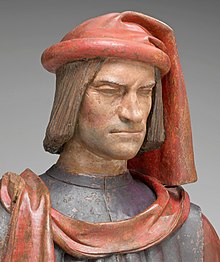Lorenzo Medici
| Lorenzo de' Medici | |
|---|---|

Bust by Verrocchio
|
|
| Lord of Florence | |
| Reign | 2 December 1469 – 8 April 1492 |
| Predecessor | Piero the Gouty |
| Successor | Piero the Unfortunate |
|
Full name
Lorenzo di Piero de' Medici
|
|
| Born |
1 January 1449 Florence, Republic of Florence |
| Died | 8 April 1492 (aged 43) Careggi, Republic of Florence |
| Noble family | House of Medici |
| Spouse(s) | Clarice Orsini |
|
Issue
Lucrezia de' Medici
Piero de' Medici Maddalena de' Medici Contessina Beatrice de' Medici Giovanni de' Medici, Pope Leo X Luisa de' Medici Contessina de' Medici Giuliano de' Medici, Duke of Nemours |
|
| Father | Piero the Gouty |
| Mother | Lucrezia Tornabuoni |
| Signature |  |
Lorenzo de' Medici (Italian pronunciation: [loˈrɛntso de ˈmɛːditʃi], 1 January 1449 – 8 April 1492) was an Italian statesman and de facto ruler of the Florentine Republic, who was the most powerful and enthusiastic patron of the Renaissance. Also known as Lorenzo the Magnificent (Lorenzo il Magnifico [loˈrɛntso il maɲˈɲiːfiko]) by contemporary Florentines, he was a magnate, diplomat, politician and patron of scholars, artists and poets. He is well known for his contribution to the art world by sponsoring artists such as Botticelli and Michelangelo. His life coincided with the mature phase of Italian Renaissance and his death coincided with the end of the Golden Age of Florence. The fragile peace that he helped maintain among the various Italian states collapsed with his death. He is buried in the Medici Chapel in Florence.
Lorenzo's grandfather, Cosimo de' Medici, was the first member of the Medici family to combine running the Medici Bank with leading the Republic of Florence. Cosimo was one of the wealthiest men in Europe and spent a very large portion of his fortune in government and philanthropy. He was a patron of the arts and funded public works. Lorenzo's father, Piero di Cosimo de' Medici, was equally at the centre of Florentine life, chiefly as an art patron and collector, while Lorenzo's uncle, Giovanni di Cosimo de' Medici, took care of the family's business interests. Lorenzo's mother, Lucrezia Tornabuoni, was a writer of sonnets and a friend to poets and philosophers of the Medici Academy. She became her son's advisor after the deaths of his father and uncle.
...
Wikipedia
